Seattle Children's launched the Science Adventure Lab in 2009, creating the first mobile science lab program directly linked to a children's hospital and the first mobile lab in the Pacific Northwest.
The Science Adventure Lab is a custom-built, 45-foot, state-of-the-art mobile science lab. It is outfitted with research-grade equipment and includes space for up to 30 students. The mobile lab travels to schools across Washington state providing innovative, hands-on science curriculum to students in grades 4 to 8.
Please note that we can only accept applications from teachers, school staff or administrators.
We typically receive more requests for visits than we can accommodate, so submitting an application does not guarantee a visit. All applications are carefully reviewed and prioritized according to the following criteria: the percentage of students receiving free or reduced-priced meal; whether the school is eligible for Title I funding; and the location of the school.
If you have any questions, please email the Science Adventure Lab team.
How to Apply
Applications are now open for Science Adventure Lab visits during the 2024-2025 school year.
Science Adventure Lab Curriculum
Each curriculum module is designed to enrich existing classroom education; provide students with highly-relevant experiential learning opportunities; and help develop the scientific and critical thinking skills needed for today’s careers. To achieve this, the modules incorporate the principles of inquiry-based learning; components of the scientific method; and science process skills such as observation, measurement, prediction and experimentation. All of the modules were developed using the 5E Instructional Model and support the relevant Next Generation Science Standards and Common Core State Standards.
There are three components to each module:
- A pre-visit activity taught by the classroom teacher
- Hands-on experiments and activities conducted aboard the Science Adventure Lab during a visit to the school
- A post-visit activity taught by the classroom teacher
All curriculum topics are carefully chosen based on the potential to teach key science skills and health information; the relevance to child health; and the opportunity to expose students to careers in science and healthcare.
Grades 4-6
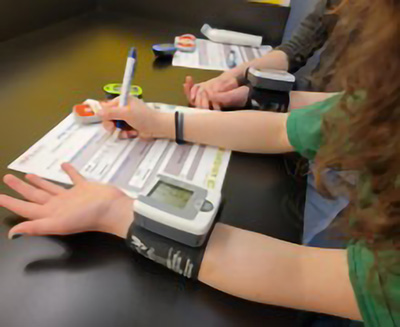
Vital Signs: Monitoring Our Body’s Systems
Students learn about how measuring vital signs reveal whether the body is functioning in a healthy way. Using the same equipment as scientists and physicians, students measure their heart rate, blood pressure, respiratory rate, oxygen saturation, and temperature.
This module is appropriate for students in Grades 4-6. The minimum time required to complete this module is 60 minutes.
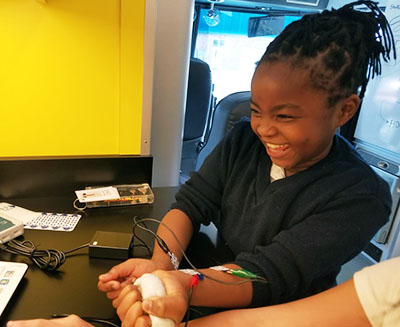
Sense, Think, Move: Exploring Brain Functions
Students engage in an inquiry-based investigation that promotes understanding of the key role of the brain as the control center in the human body and exposes students to equipment and methodologies used in the field of neuroscience.
This module is appropriate for students in Grades 4-6. The minimum time required to complete this module is 60 minutes.

Seeking the Sugar Solution: Nutrition and Chemistry
tudents conduct an experiment to determine how much sugar is in a simulated beverage using a chemical reagent (Benedict’s reagent), which produces a visible red precipitate when it reacts with sugar. Students determine the amount of sugar in the beverage by comparing the color change to that of standards containing a known concentration of glucose. They also see a visual representation of just how much sugar is in a standard serving of common drinks, reflect on their own sugar consumption, and learn nutrition and health facts that support making healthy decisions about the beverages they consume.
This module is appropriate for students in Grades 4-6. The minimum time required to complete this module is 60 minutes.

Where is Your DNA? DNA Isolation
Students will isolate DNA from a strawberry. Students learn the general steps used to isolate DNA, which include lysis, separation, and precipitation. Students learn about the properties and function of DNA and that isolating DNA is the first step in advanced biotechnology applications such as cloning, DNA sequencing, and DNA fingerprinting.
This module is appropriate for students in Grades 4-6. The minimum time required to complete this module is 60 minutes.
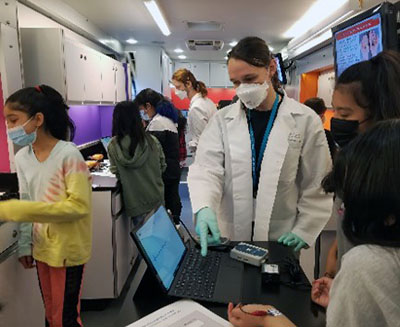
The Heart of the Matter: Exploring the Circulatory System
Students engage in an inquiry-based investigation that promotes understanding of how the heart and blood vessels work together as parts of the circulatory system to move blood around the body. This module also exposes students to equipment and methodologies used in the field of cardiology.
This module is appropriate for students in Grades 4-6. The minimum time required to complete this module is 60 minutes.
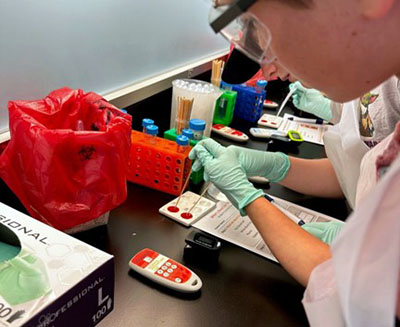
What’s Blood Got To Do With It? Exploring the Blood Components and Typing
Students engage in an investigation that promotes understanding of the components and types of blood. Students will explore how blood moves through the circulatory system and test their oxygen saturation using a pulse oximeter and test simulated blood samples to determine blood type. This module also exposes students to equipment and methodologies used in the field of hematology. Students will not use blood in these activities. All samples are artificially created to look like blood for the purposes of the experiment.
This module is appropriate for students in Grades 4-6. The minimum time required to complete this module is 60 minutes.
Grades 7-8
The modules for students in Grades 7-8 are multi-day units that require two to four lessons taught by the classroom teacher to support the mobile lab visit.
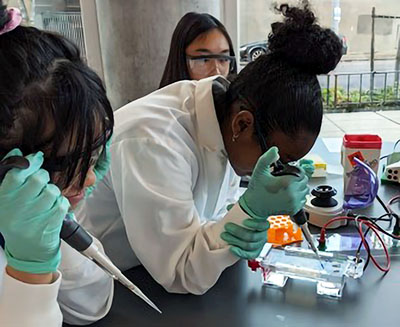
Investigations in Infectious Disease: Outbreak on the Hospital Ship USNS Relief
This 5-day curriculum unit is appropriate for students in grades 7-8 and is a partnership between the classroom teacher and Seattle Children's. There are four classroom lessons and one lesson onboard the mobile Science Adventure Lab.
- In the classroom, students will learn about the fields of epidemiology and infectious diseases, the steps of an epidemiological investigation, and how scientists can use DNA to identify the source of an infection. All materials for the classroom lessons will be provided.
- During the field trip, students will use gel electrophoresis to generate DNA fingerprints to identify the source of an infectious disease outbreak.

Colorimetric Assays: A Scientific Method for Determining the Concentration of Vitamin C
This 3-day curriculum unit is appropriate for students in grades 7-8 and is a partnership between the classroom teacher and Seattle Children's. There are two classroom lessons and one lesson onboard the mobile Science Adventure Lab.
- In the classroom, students will learn how scientists use assays to detect and quantify substances, including a colorimetric assay where the results are seen as a color change that occurs due to a chemical reaction. All materials for the classroom lessons will be provided.
- During the field trip, students will create a series of standards by diluting a Vitamin C solution and observing the relationship between color and concentration of Vitamin C.
Science Adventure Lab Safety
Safety is our priority. We have numerous precautions in place to ensure the safety of students and staff. These safety precautions include HEPA filtration, 15 air changes per hour (a standard classroom is required to have 4–6), and fully vaccinated instructors.
Lab safety video
This video introduces students to the safety rules that must be followed onboard the Science Adventure Lab.
Learning From Home: K-12 Resources for Students and Teachers
- Watch this video to learn more about COVID-19 research underway at Seattle Children's Research Institute.
- Take a virtual tour (videos) of Seattle Children’s Research Institute and meet some of our amazing scientists.
- Interested in learning more? Here are some suggested activities (PDF) you can do from home!
